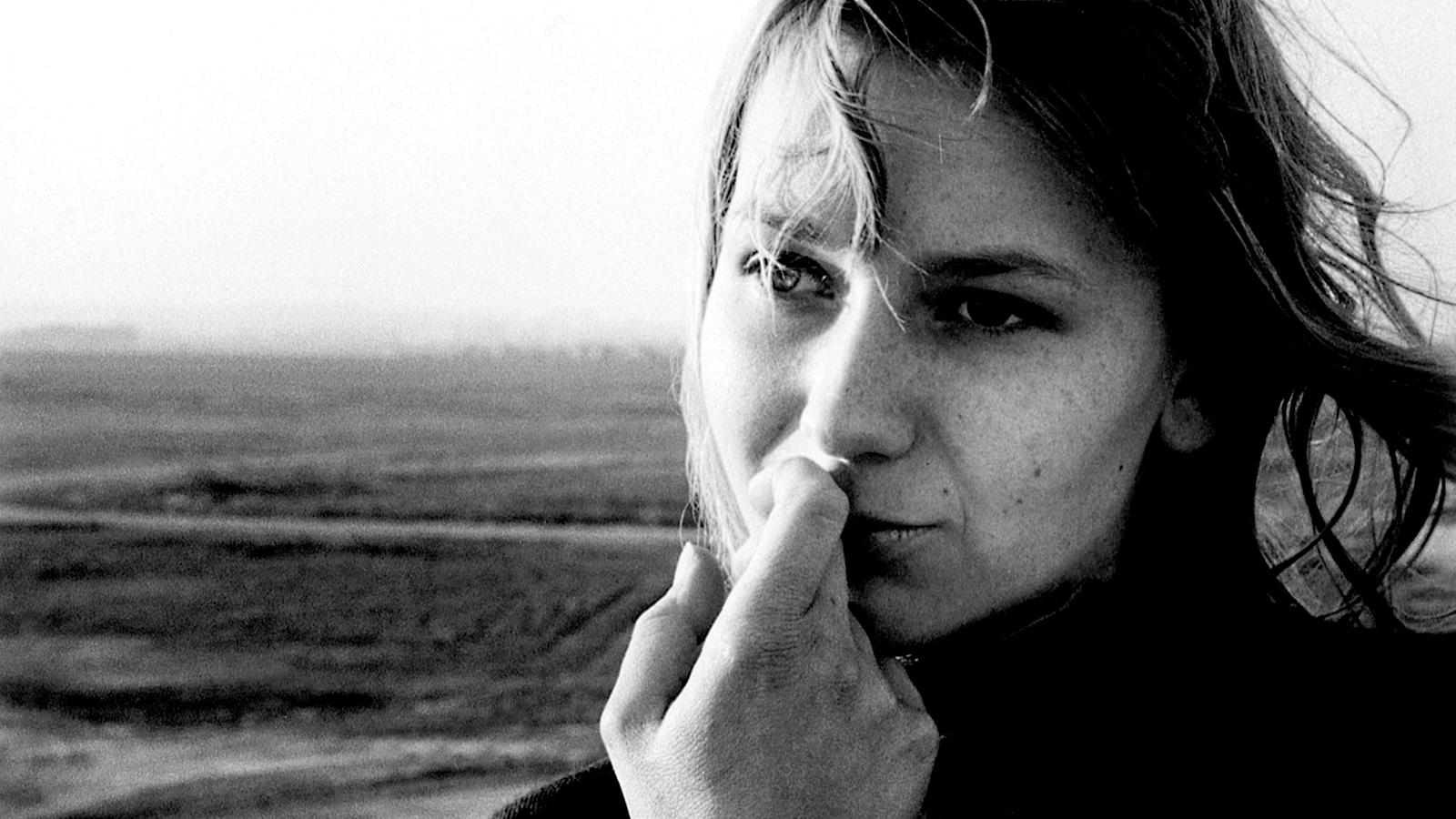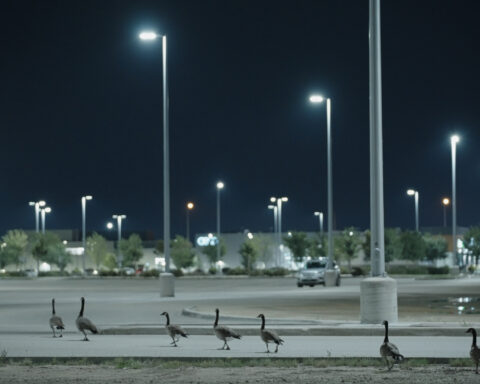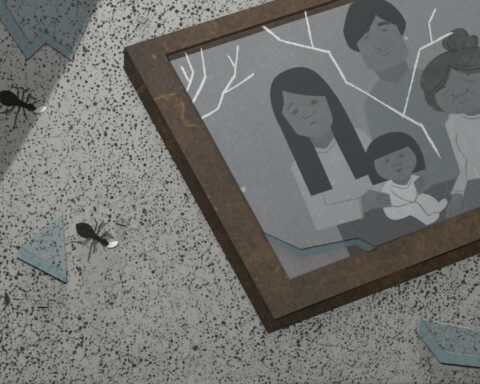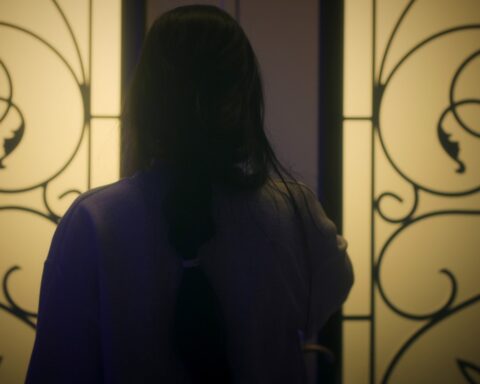Chris Marker died today. Heart failure, the death of kings. People are already gathering at the jetty in the Orly airport, an impromptu memorial for the French filmmaker as renowned for his secrecy as his movies. Half a dozen people, give or take, leaving origami felines to keep a discreet watch over the waiting areas. How did they all know to bring black roses? The news of Marker’s death is not yet public, but somehow word has reached them, though each step they take has a hitch in it, a certain tentativeness, making space for the maestro’s possible reappearance.
Why do they call airport buildings ‘terminals’? Orly is a mediumsized hub; bright adverts offer blown-up versions of a better life, while languid scrums of travellers invent new ways to leave their bodies. Two men hover near the viewing portals. Even through their sadness they can hardly help but notice that they are wearing versions of the same coat. Slowly, as if reluctant to break the spell of grieving, one of them offers his hand and a few words of introduction. Chase Joynt. Mike Hoolboom. Mike looks like he’s spent the last month sleeping in an abandoned motocross raceway while an eighteen-wheeler rolled over him. He’s a tall stick of a man, with a shock of hair that would be white if he weren’t so quick with the brown food colouring. There’s something hollowed out in his features, as if he’s presenting the remains of an archaeological dig. Chase is a couple of decades younger. He’s covered in tattoos, and has the face of someone who might be considered easygoing, though the eyes are a giveaway, soft and brown and hurting. He’s spent most of his life trying to let people in, all the while shutting them out.
Chase actually met Marker years ago in what could almost be described as a bar on New York’s fearsome Avenue C—even legends need to drink. Of course Chris Marker didn’t say he was Chris Marker. That would be gauche, as they say on the left. Like Chase, Marker is a code breaker, irresistibly drawn to the relationship between culture and aesthetics as a key to resistance, a key that might unlock the prisons of standard time and state control that both men can feel coursing through their bodies. As a filmmaker with only a few titles stacked beside his name, Chase is only too aware that some of cinema’s roads-not-taken have been cleared away by this maestro of the personal film essay, a form that Chase tries to take in his own directions. Meeting Marker was like saying hi to a cinema dad. Home and not home.
“But how did you know it was him?” Mike asks, looking for some trace of the encounter in his companion’s face.
“Film studies loves a headshot,” Chase offers. “I told him that I was also travelling with a new name and a new identity.”
“I’ll bet that piqued his interest.”
“It was as if he already knew.”
In Orly, the two men retire to a recently evacuated lounge, opening toward each other despite themselves. They can already feel the contours of something familiar between them—it lives without a name, but it’s a quality that lies at the root of what they like to call their personality. It has separated them from nearly everyone they’ve ever cared about. Only it’s not separating them now.
Chase palms the smooth, pretend-vinyl surface of the moulded chair on which he is now sitting. When he looks up, there is something in Mike’s drawn-tight skin that offers a question mark or two. He puts the black rose down on the seat beside him and pats it once, as it to keep it from straying. Mike aims himself toward a seat on the other side of the aisle, but that would put them shouting distance apart, so without giving it a second thought, as if he belonged there all along, he sets himself down beside this stranger and is greeted with the first of a series of smiles. Surprise doesn’t begin to describe the feeling. More than a few years ago he decided to cap the guest list to the party of his life, but he really likes this guy. Besides, almost immediately they launch into one of his cherished fan fantasies, which is to describe Chris Marker’s most perfect movie, movie, La Jetée (The Jetty).. Meaning: that in place of the awkward conversation between perfect strangers (what’s so perfect about them?) they don’t have any trouble opening the door of their shared obsession.
Chase starts in with a summary rap that can’t help but feel rehearsed: “Orly was the setting of Marker’s monumental La Jetée, a 1962 flick composed almost entirely of black-and-white stills. It tells the story of a Paris in ruins; it wasn’t only the ruling class that had lost the knack of getting along, the remainder were driven underground by radiation fallout, locked in a desperate countdown with dwindling resources. The last man who dreams in colour is chosen for time travel—neither young nor old, he has the kind of beauty that makes the viewer long to be ordinary. After securing rescue codes from the future, he is hunted down by state scientists and shot in the departure lounge. It was a moment he had seen as a boy, or at least caught glimpses of—it was his own death he had witnessed, and he had spent his life conspiring to return to that moment.”
Another mutual surprise shared: many of the important people in their lives are those they’d never met. The nameless man in Marker’s film, for instance, the one who found his end here in the airport. It’s as if they were both granted a wish to choose their own ghosts, their own customized hauntings. Chase marks off his companion’s razorsharp cheekbones, holding up eyes that are so tired. “I could look like him one day,” he thinks resolutely. There is something missing in Mike’s face, and Chase can almost touch it as he crouches over a heady cup of espresso. As Mike talks about the unnamed man in Marker’s film, he might be talking about himself. Traditional readings of the film remark on the hidden shape of the subject’s life as he rushes to meet an appointment with his own death, holding a mirror to his culture’s self-immolation. But what keeps Marker’s unnamed citizen orbiting the magnetic pull of Mike’s own persona choices, what marks him as a citizen of a future Mike has already recognized as his own, is that the anonymous man died twice in the movie, once at the beginning and then again at the end.
“There’s only one way a man could die after he’s already been shot dead.”
“You mean?”
“He didn’t live a double life. He lived twice.”
“Yes. Yes.”
This is an excerpt from You Only Live Twice, a new book by Mike Hoolboom and Chase Joynt that is published by Coach House Books.












